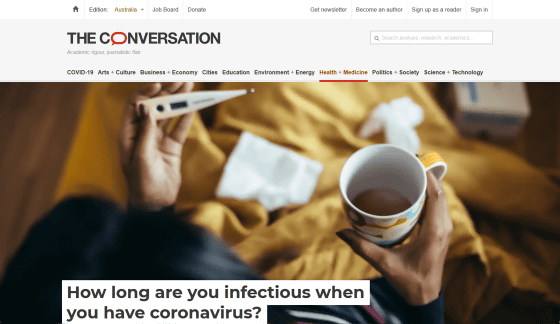How long do people infected with the new coronavirus have the ability to transmit to others?

While the new coronavirus infection (COVID-19) is rampant around the world, many people are concerned that `` A person infected with the new coronavirus can spread the virus to others for how long. Is there a possibility of depression? '
How long are you infectious when you have coronavirus?
https://theconversation.com/how-long-are-you-infectious-when-you-have-coronavirus-135295

The period from the infection with the new coronavirus to the actual onset of the disease is called the '
A virus can infect others not only after it develops. A report released by the U.S. Centers for Disease Control and Prevention (CDC) on April 10, 2020, reported that COVID-19 could be transmitted to others one to three days before its onset and still in the incubation period. I am.
At the time of writing, the virus begins to have the ability to infect others one to three days before the onset, and has the strongest infectivity to others during a period of about 8 to 10 days from the onset to the seventh day. It is considered time. However, it seems that some people may maintain strong infectivity beyond this period, and it is not safe to say that 7 days after onset.

In a
In severely ill patients, on the other hand, the viral load in the body is much higher, and many patients continue to be positive even after 10 days of onset. Therefore, the heavier the disease and the greater the amount of virus in the body, the greater the amount of virus released from the body, and the longer the infectiousness to others is thought to be sustained.
The criteria for COVID-19 to be cured are that at least 10 days have passed since the first symptom and asymptomatic for 3 days. However, one-third of the patients tested in the Hong Kong study continued to detect the virus for more than 20 days after onset, and a Chinese study detected the virus in fecal samples from patients five weeks after onset. For example, it has been shown that viruses can be detected in the body for quite some time.
On the other hand, just because a virus is detected in the body, it is unknown whether the infection will actually spread from that person. Housen and colleagues point out that more data and research is needed to make this clear.

There is a worldwide shortage of new coronavirus test kits, and the Australian government has strict standards on when to conduct tests to determine if a patient can be discharged. For example, those who were in close contact with a confirmed COVID-19 patient and were obliged to self-isolate, without symptoms after completing the 14-day quarantine period, could terminate isolation without performing a virus test. It is supposed to be good. In addition, even if COVID-19 develops but the symptoms are mild, virus testing is not required if more than 10 days have passed since the onset and there were no symptoms for 3 days.
On the other hand, critically ill patients need to be tested for virus before they are discharged from the hospital. Two samples are taken at 24 hour intervals, and if both are negative, they can be discharged. If one or both were positive but recovered well enough to go home, it is necessary to self-isolate for 10 days. The criteria also depend on the environment in which the patient lives, and those who live in an environment where there is a high risk of transmission to others need to consult with health care professionals to change test requirements, Housen and colleagues said. Was.

Related Posts:
in Science, Posted by log1h_ik







